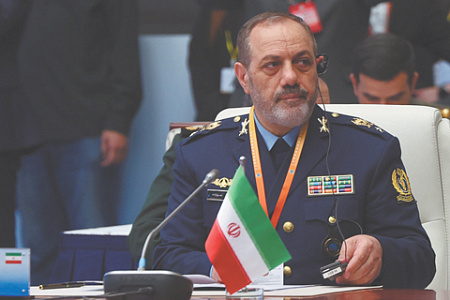
Israel has delivered a stark warning to Moscow, stating it is prepared to strike any new Russian-made air defense systems supplied to Iran. The message, delivered by senior minister Zeev Elkin, signals a sharp escalation in tensions as Israel vows to prevent the military reinforcement of its primary regional adversary following a recent conflict.
This diplomatic broadside comes amid a flurry of international activity concerning Iran’s nuclear ambitions. In the wake of a “12-day war” which the United States assesses did not fully eliminate Iran’s nuclear infrastructure, Tehran is set for crucial talks. A meeting is scheduled for July 22 with Russian and Chinese representatives, followed by negotiations on July 25 in Istanbul with the “Euro-trio”—the UK, France, and Germany—at Europe’s initiative.
“We will have to deal with these air defenses just as we did with those that were supplied before,” Elkin stated, claiming that the Israeli Air Force had already proven its ability to neutralize Russian S-300 systems in Iran during the recent war. He reiterated Israel’s long-standing view of Iran as “the main source of threat to the security of the Middle East,” warning Russian counterparts that Tehran’s pursuit of nuclear weapons and long-range ballistic missiles could eventually threaten Russia’s own security.
Elkin’s comments were made against a backdrop of deepening military and political ties between Moscow and Tehran. Recent high-level engagements include a meeting in Moscow between the Iranian and Russian defense ministers, and a direct communication between a senior advisor to Iran’s Supreme Leader and Russian President Vladimir Putin. Underscoring this cooperation, the two nations launched joint naval exercises, CASAREX 2025, in the Caspian Sea involving their navies and Iran’s influential Islamic Revolutionary Guard Corps (IRGC).
The minister drew a contrast with the situation in Syria, where a deconfliction mechanism between the Israeli and Russian militaries had largely prevented direct clashes for years. Elkin noted that despite “occasional glitches,” such as the downing of a Russian aircraft by Syrian forces, Russia generally did not interfere with Israeli strikes against Iranian military entrenchment in Syria. “Russia knew this and did not intervene, despite Iran’s displeasure,” he explained, suggesting the two countries had established “rules of the game” in that theater.
The strategic landscape, however, is being reshaped following the fall of the Assad regime in Damascus in late 2024. According to Israeli media reports, the government of Benjamin Netanyahu has begun to re-evaluate its approach to Russia. Jerusalem now reportedly views a continued Russian military presence in Syria’s coastal provinces as a strategic counterweight to Turkey’s growing influence and its ambitions to establish its own military bases in the country, adding another layer of complexity to the volatile regional power dynamics.
